Realizing that the fantasy genre can be pretty euro-centric, I decided to start researching mythologies of the world to potentially enrich the source materials and look for inspiration. These mythologies have their highs and lows, just like the ones we’re familiar with, and a part of this article deals with one of the lows. Don’t be confused and think this reflects the entirety of these people, however, and don’t think that we’re somehow much better. As I point out in this entry and many others, these cultures are not as different from ours as we think them to be – including our past flaws.
One of the great myths perpetuated about West Africa over time was that all of their religions were somehow “inferior” compared to the ones they were eventually converted to. And often the idea is that the conversion was “helpful” to them. These were excuses to try to ease the conscience of those who perpetuated so many things on the region. And. as seen with the Akan and the Fon, it was clearly never the case. I hope after the last few entries you’ve seen a lot of the similarities with other religions show the Europeans weren’t as “culturally superior” as they thought they were and that these cultures mirrored the more popular religions of our day in several ways.
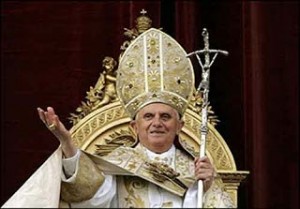
So it was a great surprise, to me at least, that one of the cultures in West Africa actually asked for evangelicals to come to them. In 1842, two of the rulers of the Efik people in the southwest corner of Nigeria, King Eyo Honesty II of Creek Town (formerly Ikot Itunko) and King Eyamba V of Duke Town (formerly Iboku Atapka), issued letters to the European traders that they wished to maintain their long standing relationships with Europe and would like to have missionaries and traders come to their land.
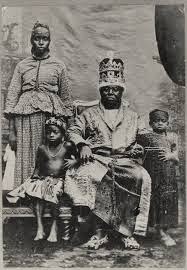
For the kings, it was primarily a business decision. Prior to the end of the Atlantic Slave Trade, European contacts had been an important part of the economy in these towns. But with the end of the slave trade, and the chance the Europeans might move on, these kings saw an opportunity to improve their region and their standing by inviting the Europeans back. Issuing letters in December of 1842, the two kings invited the Europeans to modernize their territory and evangelize their population.
Today, many of the Efik people are Christian, but there are still others who follow the old religion. Which leads one to ask: if they weren’t forced to do it, what motivated so many of them to change? Though much of it could be attributed to pressure from their kings to appease the Europeans, the fact that it wasn’t forced on everyone lead me to ask just how this transition would have taken place.
And so, in the interest of seeing what may have facilitated that sort of change, today I look into…
The Efik Religion
In the modern day city of Calabar, Nigeria, the home of the Efik people, a large number of the Efik have become Christians. The conversion began in the mid 19th century with the invitation of the missionaries and by 1900 the majority of the Efik people were well-educated in European ideologies and culture. Unlike most people in the area, the Efik didn’t make this change due to forced interactions with the Europeans. Though all people in the region were under pressure during the slave trade, the Efik had a slightly different relationship with the Europeans at the time. Due mostly to their position, the Calabar region became a major trade hub through the 18th and 19th centuries with European goods being traded for things such as palm oil and, sadly, people.
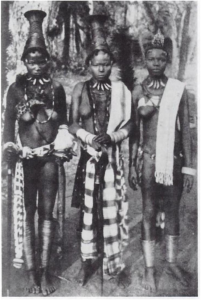
The ready acceptance of European culture after forming the trade relationship was seen as a beneficial move by their leaders in several ways. With the continued shipping of things such as Sugar, Cotton, Coffee, and Palm Oil – Calabar remained a major exporter well after the end of the Slave Trade. But another benefit that came from it was a modernization which resulted in an improved quality of life and an opportunity to celebrate the better parts of their culture and reel back some of the negatives. Prior to this time, several practices considered necessary evils put some stress on the Efik people.
What kind of stresses would those be? Simply put: their god kind of… hated them.
Abassi
According to traditional Efik mythology, Abassi was the creator of all but not much of a pleasant fellow. It’s believed Abassi is insecure, even jealous, of anyone who could compete with his power or wisdom and that he was most unfond of humans above all. The stories go to say that when Abassi first created humanity he allowed them to live on the Earth but only during the daytime. They were not to work the fields, grow their own food, or have children. They were not to make changes to the world and every night they were to respond to the dinner bell he would ring to let them know it was time to return to heaven and eat dinner with him. This way, while the humans were allowed to enjoy his creation, they would not grow in number, wisdom, or strength.
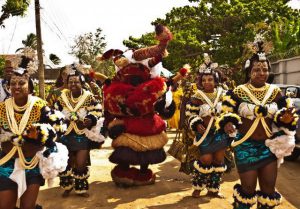
However, as time went on, eventually the first woman began to stop responding to the dinner bell, staying behind on the Earth and growing her own food and becoming independent of Abassi. After a time, eventually the first man joined her in the fields and the two of them ignored Abassi together. They went on to have children and became the ancestors of the Efik people, even going so far that some stories say the region became “overpopulated”.
Abassi was disgusted by this and enraged that they not only disobeyed him but that they were making creations of their own (the children, the crops, and their tools). Abassi grew angry with them, but was managed to be calmed by his wife, “the mediator”…
Atai
Abassi’s wife, Atai, is known as the mediator for the fact that she is often depicted as the one who has acted in favor of humanity and calmed Abassi. The first instance is that many versions of the story say it was Atai’s idea to both create humans and then allow them to live on the Earth during the daylight hours. Because of this, one could go to say that Atai is humanity’s advocate. But, despite being their advocate, her approach is a bit of tough love as well.
You see, when the human civilization began to form and the population started to grow, Atai once again stepped in to provide a compromise for Abassi. Informing him that she would handle it, Atai granted two “gifts” to humanity that would make Abassi accept their continued existence: conflict and death.

These were to control the population and thin out the numbers so that Abassi wouldn’t be as insecure about the potential of humanity. No matter what they may accomplish or how many people may be on the Earth, everyone would eventually die. And, with the introduction of chaos and strife, the more people there were in the world the more likely they would come into conflict with each other. Essentially, war is population control and makes Abassi feel better about himself.
But, despite this “gift”, Abassi remained disgusted and the gods turned their back on humanity. This, of course, led to people wanting to find ways to please Abassi again so that he might hear their pleas.
Appeasing Abassi
A driving motivation behind many Efik rituals was the fear of Abassi’s reaction to, essentially, overpopulation. Since Abassi’s original goal with humanity was to prevent them from growing and threatening his own place in the universe, anything the Efik could do to appease him was generally considered a good idea. The more people there were in the world, the angrier Abassi would be, so anything you could do to limit those numbers would make him happier and more willing to hear your prayers.

Unfortunately, the act of appeasing Abassi often came at great cost. Ritual human sacrifice was held by the Efik until roughly 1850 because they believed these sacrifices would appease Abassi and make him more receptive as a god of nature. Though not all sacrifices to Abassi required a human sacrifice, the fact that humans had defied Abassi to reproduce in the first place meant he was most receptive in these cases. When carried out, these sacrifices were usually through either impalement or burning alive (practices the Europeans only recently had stopped themselves).
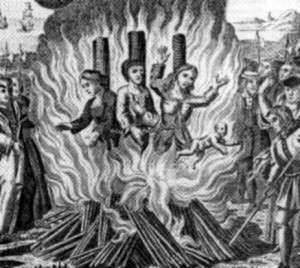
But the situation where Abassi’s interaction was most likely to help or hinder the Efik was what happened when they were terribly sick. In the Efik religion, illness was a sign of Abassi’s wrath. When someone came down sick, the tradition was to call the local “witchdoctor” to address the situation. In the ritual to follow, the witchdoctor and members of the community would call on help from Abassi, setting a fire and beginning a ceremony to ask for Abassi’s healing. Because, despite the hostility he had for humanity in the beginning, Abassi was still also the god of health and wellness. As a result, If the witch doctor could cure the illness, the idea was that Abassi was okay with them living. However, if the witch doctor failed to make that person well again, it was believed that Abassi did not want them to live (otherwise he could have cured them). When that happened, they were often also to be sacrificed to carry out his wishes.
Essentially, living under Abassi’s watch was a game of Russian Roulette, except:
- Your opponent is the creator of the universe
- You play with more than one gun
- When it’s Abassi’s turn, he points the gun at you
The Alternatives
Given this rigged game of Russian Roulette, quite a few Efik began to adopt alternatives as they became available. Though they resisted such changes when they first entered the region in the past, many began to see some benefit in these alternatives. One of the more common in the region for some time was the worship of Ala, a nature goddess of the nearby Igbo with a somewhat friendlier relationship with humanity. Ala, a nature goddess of the country of Ibo (present day Nigeria) was also a goddess of death, but in a considerably less hostile fashion. While Abassi was enraged by the growth of humanity and their working of the fields, Ala encouraged fertile crops and birth. It is even said that Ala gives birth to each person who comes into the world and that when they die she accepts them back once more to her womb.
In a similar vein, when the missionaries were eventually invited into the Efik lands, the Judeo-Christian god was an acceptable alternative for much the same reasons. Despite Jehova’s fairly wrathful nature in the Old Testament, which definitely mirrored Abassi, his stances also oppose Abassi in several key departments. Like with worship of Ala, conversion to Christianity meant adopting a god who was generally okay with the idea of procreation. Adoption of Christianity for the Efik was also adopting a god who was okay with them working the lands, even encouraging the act, and didn’t demand human sacrifice… anymore.
As a result, Jehova is in many ways similar to Abassi but also presents a different message. The story of the first death in the Efik mythology very much resembles the narrative arc of Adam and Eve being cast out of Eden. In both cases, the young humans defied the will of their god and were introduced to human suffering. In both cases, returning to that god’s good graces required appeasing the god once again. But in Jehova’s case there was a different message – go forth and be fruitful, which reflected more the style of Ala than Abassi, and may have encouraged some to adopt that faith.
Conclusions
It would be easy to see mention of human sacrifice and think it casts a negative light on the Efik as a whole. In fact, I hesitate to leave this here because of how easy it would be for people to paint the culture with a broad brush. But what has to be understood is, like a lot of cultures, these traits aren’t unique to this part of the world. In fact, the sacrifice was something that a lot of Europeans did for the same reasons for much of their history as well. In some parts of the world there are still executions for similar reasons. So to say the Efik were somehow unique in this regard would be unfair and disingenuous. In fact, outside of their somewhat adversarial relationship with their god, the Efik have had a long history of a colorful and rich culture including several rituals they maintain to this very day.
One example of a common ritual maintained to the modern day is a marriage ritual known as “The Fattening Room”. In this ritual, a young woman who is about to be married is taken to a room where she is prepared for her married life while also being fed incredible amounts of food. In the Efik culture, a bride emerging from the fattening room with some extra pounds is seen as a blessing on the relationship. Rituals like these, where they celebrate life more than punish it, make up the majority of what has survived to the modern day. Though there are still some issues raised about some of these rituals, the fact remains that the Efik of today have done much to be a force for change in their area.
With the major changes made to their society in the late 19th century, the Efik people went on to be leaders in the modernization of West Africa. Calabar, the modern city that encompasses the three major city-states of the Efik people, is now a thriving city with rich culture and a seaport which continues to serve as a major trade center. They’re also the home of one of the most prominent schools in the country, the University of Calabar, and an international Museum. They’ve become a destination for tourists, boasting several hotels and a Christmas festival which is a worldwide draw that runs throughout the month of December where they put on one of the greatest celebrations of the year…
Because nothing is better revenge against a jealous god than living well.
(I write books. I also write this blog. I’m sure that pisses off Abassi.)


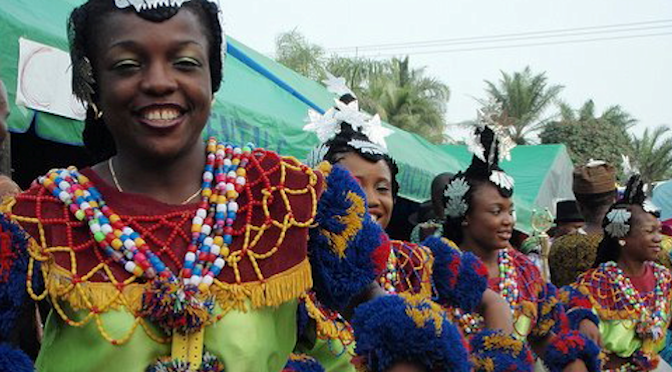




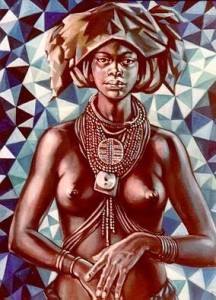





..
The essay is enlightening enough . Kudos